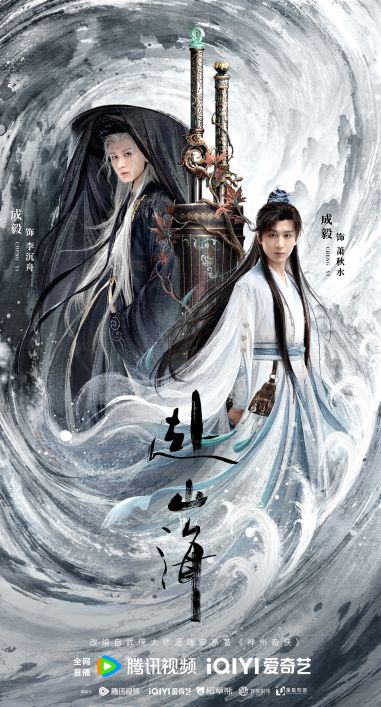
Short Review: The Journey of Legend (2025) 赴山海
Summary: Xiao Ming Ming (ft Cheng Yi 成毅) as a kid was full of passion for justice who loved reading martial-arts (Wuxia) novels . But after becoming an adult, he’s now a timid and dull every day worker. His only outlet for his childhood passion is to write Wuxia stories online. His writing company developed a “Demon Tome”, essentially an AI system that projects the user as the protagonist into the story. Xiao Ming Ming tried to write a story based on Divine Land Heroes that retold the story with the lead Xiao Qiu Shui as the master of everything. This story was too ridiculous even for the “Demon Tome”. Xiao Ming Ming gets sucked into the AI to live the story of Xiao Qiu Shui and his adventures.
Platform: Tencent, iQiYi
Episodes: 40
Airing Date: September 11, 2025
Final Rating [after 15 episodes]: 6.0/10 – Cheng Yi sleepwalks through this much-anticipated adaptation, weighed down by mumbling diction, a lethargic portrayal, and performance too similar to Li Lian Hua. The show itself is a muddled mix, unsure whether it’s a martial-arts epic, a time travel story similar to Joy of Life, or a fantasy tale.
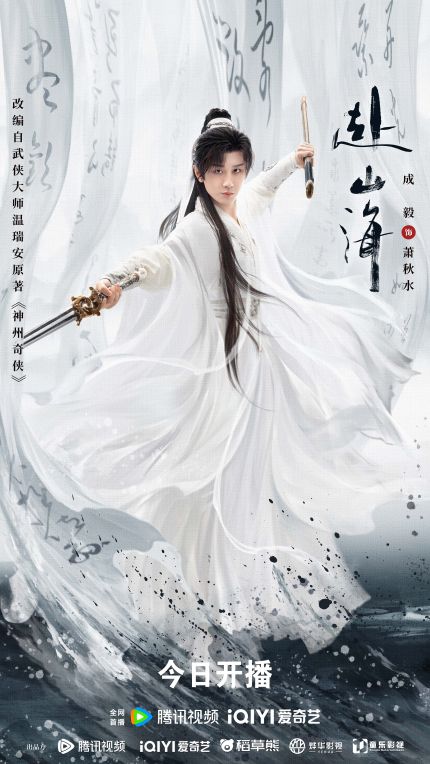
Xiao Qiu Shui 萧秋水 Cheng Yi 成毅
3rd son of the Xiao Family and member of the Huan Hua Sword Sect who embarks on a journey to protect friends and family.
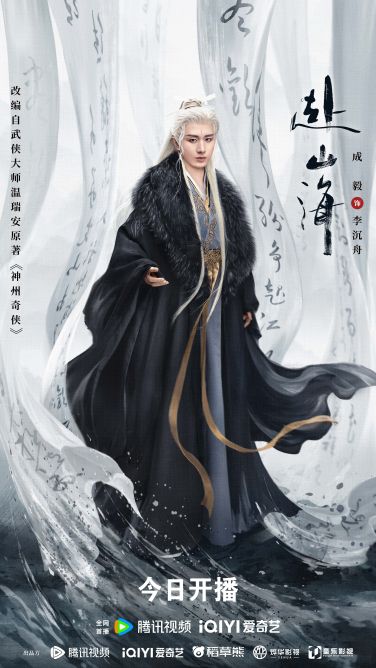
Li Chen Zhou 李沉舟 Cheng Yi 成毅
Leader of the feared Power Clan. He amasses power for other reasons.

Xiao Xue Yu 萧雪鱼 Gu Li Na Zha 古力娜扎
Adopted daughter of the Xiao family and is skilled in medicine.
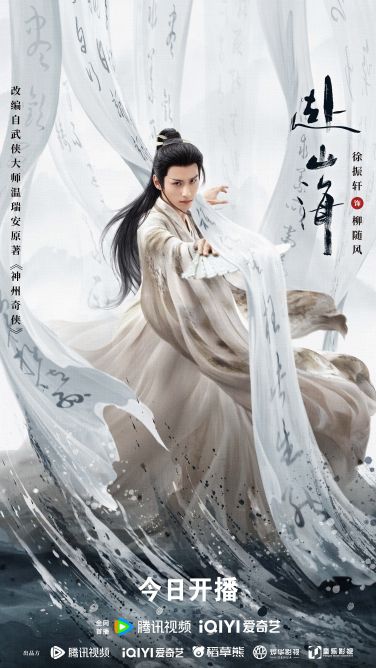
Liu Sui Feng 柳随风 Xu Zhen Xuan 徐振轩
Second in command at the Power Clan. He holds a deep grudge against the Huan Hua Sword Sect.
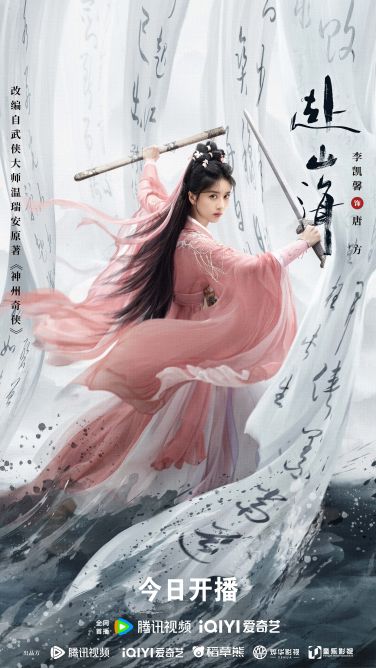
Tang Fang 唐方 Li Kai Xin 李凯馨
Member of the Tang Family Sect who is wants to save her father
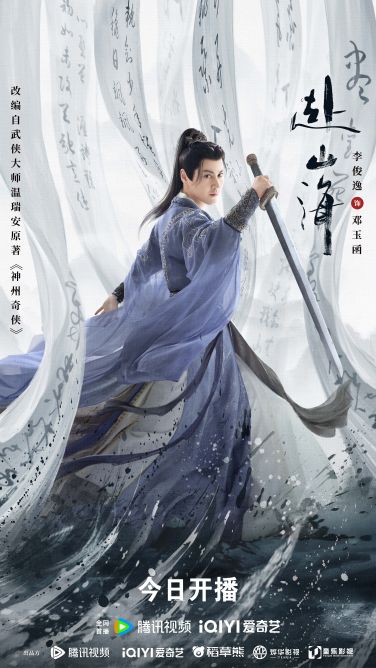
Dengn Yu Han 邓玉函 Li Jun Yi 李俊逸
Loyal friend of Xiao Qiu Shui
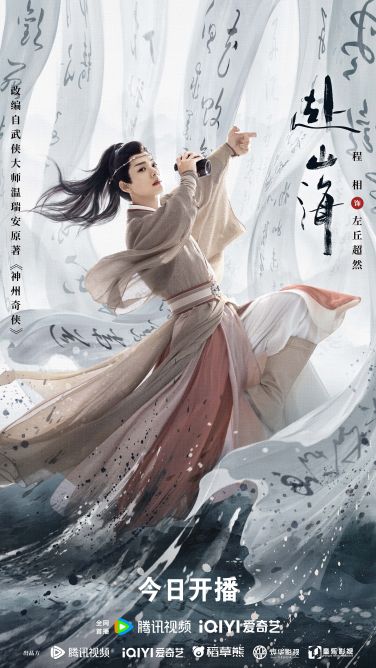
Zuo Qiu Chao Ran 左丘超然 Cheng Xiang 程相
Loyal friend of Xiao Qiu Shui
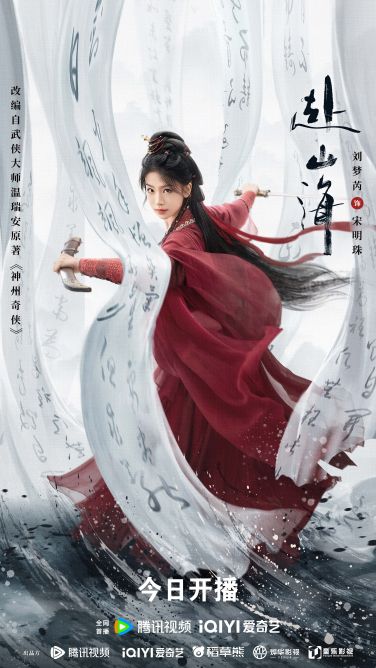
Song Ming Zhu 宋明珠 Liu Meng Rui 刘梦芮
Loyal member of the Power Clan
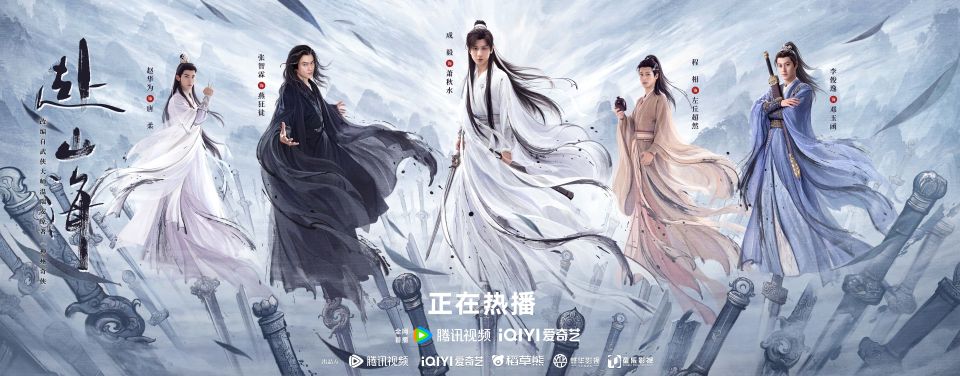
Overall Thoughts
Based on the wuxia novel Heroes of the Divine Land (神州奇侠), The Journey of Legend attempts to reimagine the traditional martial arts drama by incorporating a modern-day character who is transported into the alternate world of the story. While similar “realm-travel” tropes have recently appeared in series such as Joy of Life and The Guardians of Da Feng, this element was not part of the original source material. The adaptation therefore takes significant creative liberty by adding the time-travel dimension to an otherwise classical wuxia narrative.
The drama stars Cheng Yi (成毅) and Gülnezer Bextiyar (古力娜扎), two established leads, but it is unmistakably a “male-centric drama” built entirely around the main character. This marks Cheng Yi’s first period drama since the 2023 breakout hit Mysterious Lotus Casebook (莲花楼). Much of that production’s original team, including the director, crew, and even parts of the supporting cast, reunited in hopes of recreating that prior success.
Given the goodwill Cheng Yi earned from his portrayal of Li Lian Hua in Mysterious Lotus Casebook, expectations for Journey of Legend were sky-high. With a rumored production budget of 300 million RMB and visually stunning promotional stills, anticipation was immense. Fans poured money into online “seat purchases” to boost its visibility, and millions reserved the show before release. With no major competing period dramas at the time of release, this was expected to be the breakout drama of the season.
I do want to call out some of the troubles the drama faced. The series notably involved real-life Shaolin monks, one of whom tragically passed away in an accident unrelated to filming. The original May release was then delayed after leaked voice messages allegedly from Singaporean actress Li Kai Xin containing anti-China remarks sparked widespread controversy. Rumor is, the production team was forced to weigh the drastic option of cutting her scenes and re-editing the show when the controversy first surfaced. Meanwhile, Li Kai Xin pursued legal action disputing the authenticity of the recordings. The ensuing uproar pushed the premiere back to September.
When Journey of Legend finally aired, the result was disappointingly disjointed. The premise failed to deliver an engaging martial arts narrative to capture audiences. In the first 10 episodes, the protagonist Xiao Qiu Shui’s motivations seem limited to simply “completing the story” rather than embodying the spirit of a wuxia hero. The martial arts choreography is extremely inconsistent. Much of it is more akin to the fantasy combat of Xian Xia (Fantasy) dramas than traditional martial arts.
Cheng Yi’s performance as Xiao Qiu Shui falls short of expectations. His diction is often unclear, and his expression flat, failing to capture the charisma or youthful idealism the role demands. The overall drama is rough. There’s poor green-screen compositing, visible rendering errors, and uneven cinematography. Cheng Yi appears under a heavy beauty filter that renders him unnaturally pale and wrinkle-free, a distracting contrast to the more natural appearances of his co-stars. After 15 episodes, I found it difficult to continue watching.
The drama, its critical reception, and ratings, were anything but a hit. Critics and viewers alike panned the series for its weak storytelling and subpar acting, questioning how such a costly production could yield such a rough production. On Tencent, the show’s popularity index failed to surpass 27,000, and on iQIYI, it never reached 9,000. These numbers are terrible for such a highly anticipated drama. Online commentary has been merciless, turning Cheng Yi, the director, and the production team into subjects of ridicule.
While not all of the backlash directed at Cheng Yi is deserved, his remarks during promotional interviews where he seemed to blame viewers for “not paying enough attention” to the drama fueled further resentment. His fanbase’s combative defense of him online has also alienated casual audiences. The result has been reputational damage that now casts a shadow over his upcoming projects, including Fox Spirit Matchmaker: Wang Quan Chapter (狐妖小红娘·王权篇).
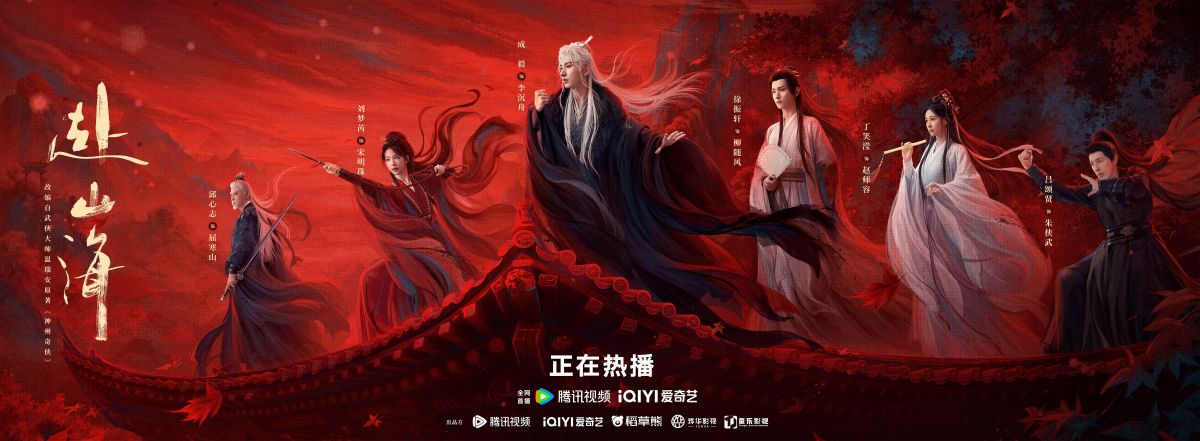
What I Liked
- Sprawling Jiang Hu and Wu Lin: As someone who grew up reading and watching Jin Yong and Gu Long’s wuxia classics, I’ve always been drawn to a richly imagined Jiang Hu, a sprawling martial world where each sect possesses its own fighting style, history, and entangled web of grudges. The Journey of Legend captures some of that spirit. The story incorporates elements of political intrigue while introducing a vast cast of characters, each representing different sects within the martial world. Watching their hidden motives and rivalries unfold is one of the more enjoyable aspects of the drama.
- Xu Zhen Xuan as Liu Sui Feng: Among the main characters, Liu Sui Feng stands out as the most compelling. He has a clear motive and acts decisively on it, to seek revenge on those who murdered his family. Cunning and cold-blooded, yet capable of loyalty and gratitude toward those who have aided him, Liu Sui Feng feels more grounded and multidimensional compared to the rest of the characters. Unlike Xiao Qiu Shui, he isn’t aware that the world he inhabits is an AI construct, so every choice he makes is guided by instinct, reason, and survival. This tension makes his journey particularly engaging. Xu Zhen Xuan delivers a nuanced performance that captures both the character’s ruthlessness and his buried humanity, making Liu Sui Feng one of the few bright spots in an otherwise uneven narrative.
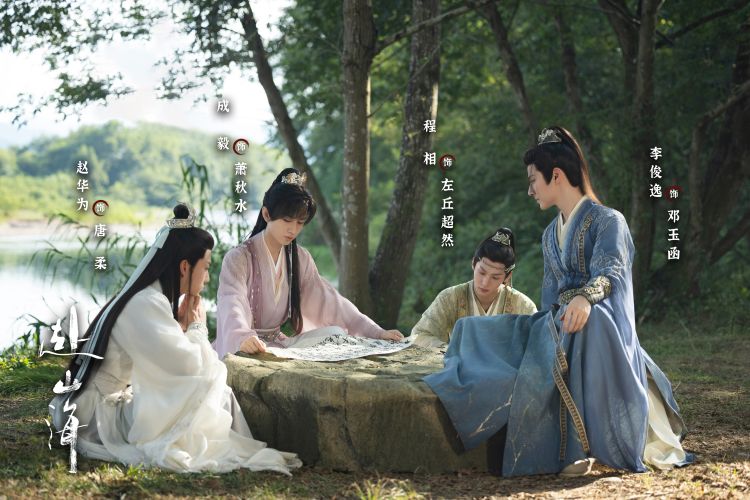
What Didn't Work
- Cheng Yi as Xiao Qiu Shui: Unlike in Mysterious Lotus Casebook, where Cheng Yi shared the spotlight with Zeng Shun Xi and Xiao Shun Yao, this adaptation places him squarely under the microscope. Unfortunately, his performance does not withstand close scrutiny. To start with the positives: Cheng Yi’s strength lies in portraying fragile yet emotionally intense characters. Those are his most popular roles such as Li Lian Hua and Yu Si Feng. They are roles that demand scenes of internal torment, physical frailty, and blood-spitting theatrics. In those moments, he truly shines, conveying pain and melancholy with precision. His martial arts postures are also visually striking. He does very well in this drama in those types of scenes. Unfortunately, the rest of his performance leaves much to be desired. The most glaring issue is his diction. His enunciation is so unclear that dialogue often sounds mumbled and sticky, as if he never fully opens his mouth to articulate. Without subtitles, much of what he says is nearly incomprehensible. I called out this problem in Mysterious Lotus Casebook but many people wrote that off as the character was rather sickly and it fit the character. Cheng Yi’s Xiao Qiu Shui also comes across as oddly lethargic. For a supposedly spirited young hero, he exhibits little genuine emotion or energy. His voice acting lacks inflection, resulting in a flat and monotonous delivery. Compounded by his slouched posture and passive body language, he often looks disengaged from his scenes. Compared to Yang Yang’s upright, poised portrayal in The Immortal Ascension, Cheng Yi’s Xiao Qiu Shui feels like a meek imitation rather than a convincing martial hero for most of his scenes. What’s more disappointing is that his Xiao Qiu Shui feels nearly indistinguishable from his earlier role as Li Lian Hua. From the hairstyle to habitual gestures like flicking his sleeves and sighing between lines, those ticks are extremely obvious when one pays attention. Instead of crafting a distinct new character, Cheng Yi seems to have recycled his old performance, staying within his comfort zone. Unfortunately, it doesn’t work here.
- A Muddled, Identity-Confused Plot: The story itself suffers from an identity crisis. It tries to be simultaneously a Wu Xia drama, a realm-travel fantasy, and a political drama and fails to succeed at any. The original novel was a traditional martial arts drama that followed the adventures of a young Xiao Qiu Shui in the backdrop of the political landscape of the Northern Song Dynasty. The adaptation, however, introduces a modern protagonist, Xiao Ming Ming, who is transported into Xiao Qiu Shui’s body through an AI writing system. The early episodes lean heavily on comedy, seemingly trying to emulate Joy of Life, but without its sharpness or charm. Xiao Ming Ming also only vaguely knows the plot of the story. The result is a protagonist who feels entitled and unlikable. He is constantly bending the “rules” of the simulated world to his own advantage. The show arbitrarily grants him advanced martial arts skills without explanation, leaving viewers wondering how a 21st-century man suddenly fights like a seasoned warrior. He must follow the rules set for the by the AI and as I’m watching, I don’t actually understand the plot of the story. Is it supposed to be following a new adaptation or the original plotline? It’s as though Xiao Qiu Shui is playing a video game and all of the other characters are just NPCs there to serve him.
- Lazy martial arts: During the initial marketing push, the drama kept touting that this was finally a worthy martial arts drama with Cheng Yi’s fans were lauding Cheng Yi’s martial arts skills. There are some decent fight scenes but the vast majority are laughably bad. Enemies often stand idly in a circle waiting to attack, characters pause to pose before striking, and genuine hand-to-hand choreography is rare. Most of the battles also look extremely chaotic and messy. In one scene, Xiao Qiu Shui storms in and just taps the enemies to the left and right to “defeat” them. He’s just swinging his sword but has the music and ending pose to match. From the scenes I’ve seen, his moves are basically swing, twirl, and then pose. In another scene, random enemies fly from the sky but are somehow all pushed back by one sword slash from his father. I was wondering if I was watching a fantasy drama instead. For a martial arts drama, I also never know what are the different styles of martial arts. Xiao Qiu Shui is a member of the Huan Hua Sword Sect but I barely see signature moves. That applies to the other martial arts sects even though the drama features real life martial arts sects of Shaolin, E Mei, and Wu Dang.
- Costumes don’t make sense for a Wu Xia drama: I will be the first to praise the beauty of the costumes featured in the drama. Each character has multiple, intricately designed ensembles that showcase high production value. Unfortunately, they are ill-suited for a martial arts setting. Xiao Qiu Shui’s has a dizzying array of outfits of different colors that span the rainbow but most of them feature flowy sleeves. Even when his outfits have a tight arm guard, there’s somehow a flowy arm section. None of the other characters wear tight-fitting outfits that would indicate they are men and women with marital arts training. They look more like cosplaying martial arts characters or else from a fantasy drama. When they do fight, it’s very hard to follow the battles because I’m just seeing huge masses flying around the screen. It’s not to say that other Wu Xia adaptations didn’t have flowing outfits, but at least the characters would wind up their arms to acknowledge the existence of the sleeves. The production also directly copied several outfits from Mysterious Lotus Casebook which was caught by many eagle eyed viewers and angered fans because a few of these copied costumes were limited edition costumes that were supposed to have been sold for charity.
- An unpolished final product: The biggest issue that I and most people have with this drama is that the end product definitely does NOT justify the 300M price tag. The whole entire production looks very rough. The editing is sloppy, the green screen work is painfully obvious, and many sets look blatantly artificial. There are some scenes where people’s faces are cut off in the background as the camera pans elsewhere. It’s a breath of fresh air when the cast is actually shooting on location. Episodes 14 and 15 feature especially poor set design, with synthetic turf and flat lighting that betray the illusion of realism. In one scene, Cheng Yi can be seen holding his script and that’s not the only time a script is lying around. The sound mixing is equally lackluster. Background music frequently drowns out dialogue. The cast often sit in the Xiao family manor and there’s a waterfall in the background and the falling water is deafening. I could have forgiven some of the bugs but for a drama that kept promoting its heavy price tag, the end result definitely does not justify the cost. There are plenty of other dramas with a smaller budget who deliver an outstanding product which is why this is even more disappointing.
- Who’s the female lead?: For a series ostensibly starring Gu Li Na Zha as the female lead, her limited presence is baffling. I understand that this is a Wu Xia drama and the focus should be on the male lead, but fifteen episodes in, she has appeared fewer than ten times and has minimal interaction with Cheng Yi’s character. In contrast, the second female lead, Tang Fang, receives far more screen time and development. There’s nothing wrong with that but it’s a big waste to cast Gu Li Na Zha with her to do essentially nothing.
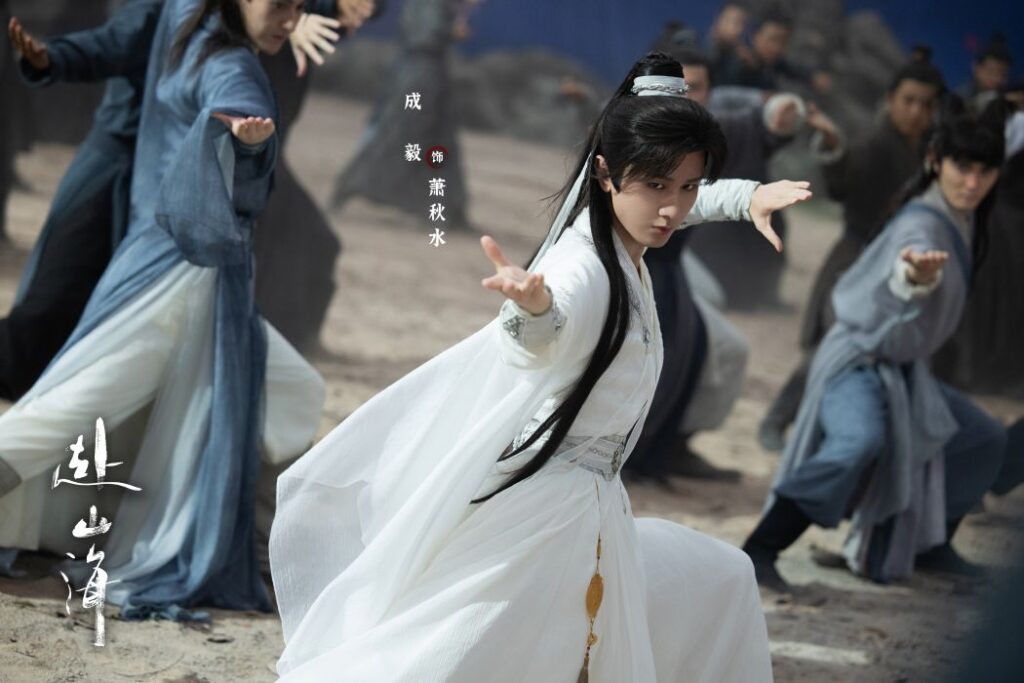


Long time reader, first time commenter here (sorry I’m bad for engagement – I only binge watch cdramas to catch up so i’m never around for active engagement of shows).
Similar to you, I grew up watching a ton of a wuxia shows (namely TVB reruns on pirated DVDs bought from shady places in HK during family vacations lol) so I enjoy every little bit of it we get these days. I enjoyed Immortal Ascension so I came into this hoping for a similar thrill, but I really couldn’t get past the first 10 episodes easily and even then I did the dreaded skipping and fast forwarding to get to the major plot points.
I agree with basically all of your critiques and I just wanted to reiterate my overall disappointment with this. I wish they would have just leaned into one direction or another, pure wuxia or more joy of life, cause I immensely enjoyed Joy of Life S1/S2. But we got a mixed bag of conflicting identities.